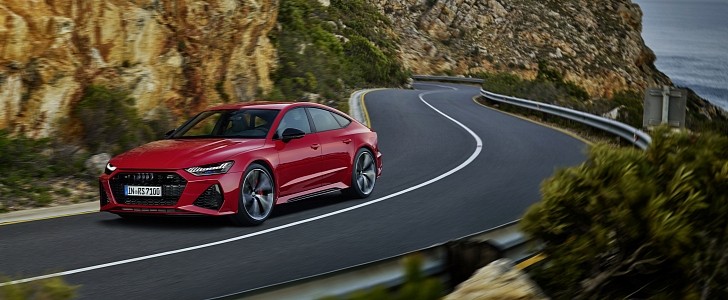Moments like these are rare and they will soon become much rarer. Perhaps it was one of the last experiences of this kind at all.
Moonlight Night
It was as though
Heaven Had softly kissed the Earth,
So that she in a gleam of blossom
Had only to dream of him.
[...]
And my soul spread
Her wings out wide,
Flew across the silent land,
As though flying home.
Author's note: “Mondnacht” (Moonlight Night) is a poem by the poet Joseph von Eichendorff, written in the German late Romantic period and first published in 1837.
As we slowly roll out just before our destination, I can't get Moonlight Night out of my head. Eichendorff certainly didn't drive an Audi RS7 Sportback, probably never traveled faster than a steam locomotive in his whole life. And yet you could imagine that those lines had come to him in the middle of this wonderfully fragrant landscape of fine leather and soft Alcantara.
It was a wonderful day, the sister-in-law had married “the right one”, the sun and the guests laughed and the food was the best. Even the offspring took great pleasure in the hustle and bustle, so much so that she allowed herself to be strapped into the Isofix four-point harness child seat only under protest.
It was clear to her: now you must sit still for a few hours. What she hadn't expected: her first encounter with a bitterly evil V8. A brief full-throttle push in Sport mode abruptly interrupted her rant, practically smothering her in an expression of the greatest delight: O-N-C-E-A-G-A-I-N!
Shifting briefly from eight to three, sending the pedal to the metal as mercilessly as it can possibly go and putting the four-liter bi-turbo into full boost will make your hair stand on end, the thrust of 600 PS simply drives in, no matter how long you've been doing the job. It's something you'll never forget - and I mean the dad, not the kid. W-O-O-A-H. Silence. O-N-C-E-A-G-A-I-N!
At some point, she was able to dub the synthesized overrun gunshots of the Audi in an accurate sequence, finally got tired, and gently fell asleep. Only to be abruptly awakened on the concrete slab bumpy road of the German autobahn A81 in the staccato of the RS chassis front axle rumble. It's one of the drawbacks of German horsepower bolts that "sportiness" always must be translated into "exaggerated harshness."
The solution was quickly found: Higher speed! Not only did the chassis prove more supple, but the wind gently tearing at the frameless double windows reliably whispered the offspring to sleep. And suddenly it happened, the whole car was asleep.
The strains of the day passed from the lips of both ladies with a big sigh, the playlist could be switched from children's songs back to a genre that audibly took the irritation out of the Bang & Olufsen system when you suddenly notice the digital speedometer: 250, 260, 270.
Inexorably, it rattled through the numbers. And the chassis, which was annoyingly bumpy just a few kilometers ago, suddenly took on a completely new character on the freshly laid pavement of the autobahn A3 heading for Frankfurt.
Heavy, highly concentrated and focused only on the one thing: Absolute control. You can apply every curve radius perfectly, even at these absurd tempos. No correction, no blurring, but also no nervousness. Here, close to three hundred, the Audi RS7 suddenly reduces itself to what it really is: a high-speed machine. Here you realize that it makes a difference whether a car can go 150 or 320 kph (199 mph).
Of course, there are those who think this is bad, because of course it takes more resources. Especially if you don't use the capabilities and then constantly carry tires, brakes and a high-performance chassis around unnecessarily.
You would have to hand them the keys to such a car more often and they would fall silent forever. They would stop calling for bad cars just because the good ones are so rarely needed. Because at 130 kph (81 kph) it makes little difference whether you sit in a Dacia Duster, or in an Audi RS7.
At 300 kph, however, it does. It's the demand, the will, your own abilities. The full class of the big Ingolstadt car doesn't show itself in the corner, not on the Nordschleife, but when you come home after a hard day with child, dog, and luggage.
Or according to Eichendorff: When he spreads his soul, spreads his wings, and flies you home. Because that's all this Audi was built for. But for how much longer?
It seems that Germany has managed to avoid a general speed limit for the time being, despite the participation of the Green Party in the government. Nevertheless, the sign with the pale gray stripes seems to have had its day.
There is no need to debate the pros and cons now, it's all about this one night and a special occasion that places a very specific demand on a car, which is met not only by Audi with the RS7, but also by BMW M, Mercedes-AMG, Porsche, and few others. Because they can and because they want to. Because they want to take on the task and find the best possible solution. Because they give their all and have created a masterpiece.
In this particular sense, an Audi RS7 is closer to Eichendorff than one might think. It is - and this is perhaps a way of characterizing it for a wider circle - art. And it has to be understood as such. Whoever can do that can consider himself lucky. Because they get more out of life.
In the case of the RS7, one thing above all: time. And isn't that the most important thing of all?
